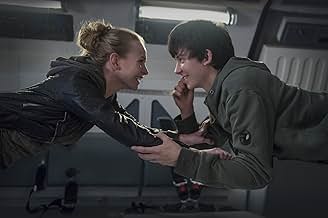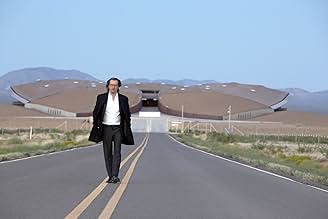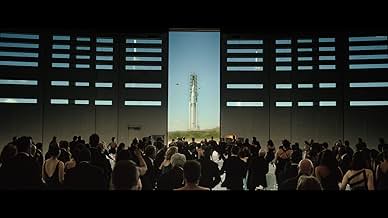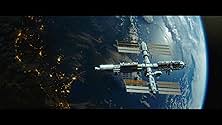Le premier humain né sur Mars se rend sur Terre pour la première fois et découvre les merveilles de la planète avec un regard nouveau. Il se lance dans une aventure avec une fille débrouilla... Tout lireLe premier humain né sur Mars se rend sur Terre pour la première fois et découvre les merveilles de la planète avec un regard nouveau. Il se lance dans une aventure avec une fille débrouillarde pour découvrir ses origines.Le premier humain né sur Mars se rend sur Terre pour la première fois et découvre les merveilles de la planète avec un regard nouveau. Il se lance dans une aventure avec une fille débrouillarde pour découvrir ses origines.
- Réalisation
- Scénario
- Casting principal
- Récompenses
- 4 nominations au total
- Alice Myers
- (as Lauren Myers)
- Centaur
- (voix)
Avis à la une
I liked Asa Butterfield as the eponymous character in "Ender's Game," and he's just as good here. Before you tag me as an Asa fan, I didn't like him in Scorsese's "Hugo." Here, he was convincing as a Mars-born child with his childlike, guileless naiveté and tall, gangly build. One professional critic compared this with "Flight of the Navigator," but Gardner isn't the smartmouth kid like David was in that movie, and Asa is a far, far better actor than Joey Cramer was. Likewise Gary Oldman, some of whose roles I have detested (his Doctor Smith in the awful "Lost in Space") while others like his Commissioner Gordon in Nolan's Batman movies were fine. The critics think he was over the top as billionaire mogul Nathaniel Shepard, but I found him to be a rather plausible mix of Steve Jobs' salesmanship, Elon Musk's arrogance and spaceflight ambitions, and Howard Hughes' fascination with flying and reclusive eccentricity.
You can tell that many of the movie's fiercest critics here have their own agendas, usually trying to prove they're smarter than the writer. All their comments do is reveal their closed minds and often their ignorance. One smart aleck claims Gardner's mother looked 5 months pregnant in the film. The shot where she peers out of the spacecraft window as she cradles her expanding belly was at an indeterminate time sometime after her sonogram two months after launch, possibly right before landing more than seven months after launch. Same person talks about Mars gravity being 2/3rd of Earth's. No, it's 1/3rd. Plus she complains that the Earth's resources are said to be depleted. That phrase was Nathaniel reading from a letter he wrote to the President as a 12-year-old, full of youthful enthusiasm and exaggeration, not stated as actual scientific fact. Another critic tries to look intelligent by saying Mars is four light minutes away. It is at its closest, but the distance isn't constant and is over 22 light minutes at its furthest. (Another genius here claims it's 90 light minutes each way.) The communication with Mars was instantaneous because they clearly plastered "QuantumCom light minute compression" on the comm screens to imply they've figured out how to use quantum entanglement for instant data transfer at interplanetary distances (still inplausible as it's based on a common misconception, but still far less fantastical than laser swords, warp drive, time travel, telepathy, teleportation devices or humanoid aliens attacking to steal our water, oxygen, etc.). Besides, it's a dramatic technique, as waiting minutes between messages with no realtime interaction just isn't very interesting, unless you liked "You've Got Mail." Another critic who claims to be an MD rated the movie 1 star for no other reason than they pronounced a test "TROponin" rather than "tropPOnin" as he preferred, even though the former is in fact the correct pronunciation, as any medical dictionary can confirm. I wouldn't want him as my doctor, or even playing one on TV. One complained that Gardner's mother was too young to be a mission commander, but probably never said the same about the similarly young Jessica Chastain in "The Martian." Another smart guy claimed the spacecraft would have accelerated halfway to Mars, providing gravity all the way, then turned around and decelerated. Anybody with a knowledge of physics would laugh him out of the room after telling him that would require several times more reaction mass (fuel) than the total mass of the entire spacecraft, a physical impossibility. One critic savages the movie for having contemporary products in it. It's a relatively low budget science fiction film, not a $400 million blockbuster. They spent their budget on more important things like CGI effects, spacecraft props, Mars sets and weightlessness effects, not wasting it creating an entire future Earth, and the projections in movies set in the near future like "2001" always turn out looking dated after a few years anyway. You get the idea; the criticisms are generally incredibly petty, nitpicky and often just plain wrong. I can see plenty of scientific and technological mistakes, especially the Dream Chaser spacecraft used at the end, which would need a large booster and a launchpad rather than taking off using its own small rocket engines from a runway. But I accept that this is a movie, not a documentary, and focus on the characters, whom I did like and care about.
Basically, the critiques boil down to "it's for kids!" As someone approaching retirement age, I'd much rather be young at heart than cranky and old in the head.
What doesn't work well is the back story, about the boy being born on mars. It makes for a pretty uneven film that starts out as a sci-fi movie with a crew of astronauts heading out to the stars, then morphs into something completely different. The special effects in space are wasted, because this part of the story didn't really need to be shown. Plus, some of the incidental music doesn't work too well.
The makers should've just stuck to the story of a lost boy who wanted to see the world, and a girl who just didn't fit in and was willing to show it to him.
"The Space Between Us" follows the life of Gardner Elliot (Butterfield), the first person born on Mars, who wants nothing more than to come to earth. Astronaut Sarah Elliot (Janet Montgomery), unaware that she's pregnant, is going into space, leading the first group of humans to actually live on Mars. At the end of her long trip to the Red Planet, she goes into labor. Sarah delivers a healthy baby boy, but dies immediately afterward, which creates a long list of complex problems. The private company which financed the Mars colony (known as "East Texas") is concerned about a probable public relations nightmare (and possible resulting loss in their funding) – but is also very worried about how the young boy caught in the middle of this situation will grow and develop – physically (in Mars' gravity) – and emotionally (with no parents to care for and raise him). After the company's board discusses all of the implications of the situation, Nathaniel Shepherd (Gary Oldman), the company's visionary creator, and Tom Chen (BD Wong), the company's CEO, agree to lie to the world about the reason for Sarah's death, keep her infant son's very existence classified and leave the boy on Mars to grow up in "East Texas".
Gardner ends up being raised by scientists, but mostly astronaut Kendra Wyndham (Carla Gugino), who looks after him and is the closest thing he has to a mother, but it's not the same as actually knowing his own mother. When we see him as a 16-year-old, his intelligence is obvious, but we're also aware that he has never had a friend (or even met anyone) his own age. He builds a robot with rudimentary AI, but it's not the same as having an actual best friend. He has struck up a Skype friendship with a teenage girl who goes by the nickname of Tulsa (Robertson), but Gardner has to lie to her about who and where he really is. Tulsa is a foster kid who was abandoned by her parents when she was four and has been transitioning from bad foster home to bad foster home ever since. Tulsa is jaded and a little bitter, while Gardner is naïve and optimistic, but their shared longing to break out of their current circumstances helps them to bond, along with their shared experience of not having been raised by their birth parents.
When the doctors at East Texas come up with a medical procedure that solves some of the physical challenges Gardner would encounter in earth's gravity, those at NASA and at Shepherd's company who always wanted Gardner to have his chance to visit earth finally prevail and Gardner is prepared for his first trip from the Red Planet to the Blue Planet. When he arrives, he is immediately placed in quarantine while doctors run tests to determine whether he would be in any medical danger on earth. Anxious to experience earth for himself, and worried that the scientists are going to send him back to Mars, he escapes and makes his way to Colorado to meet Tulsa. She is very skeptical when he tells her the truth about his background, but she helps him evade Shepherd and Kendra (who are desperately searching for Gardner) and the two teens go on a road trip to fulfill Gardner's ultimate goal of finding his father.
"The Space Between Us" is creative, entertaining and touching, but noticeably flawed. Butterfield is perfectly cast and exudes an earnest sweetness that is captivating, while Robertson does her usual excellent work, but doesn't feel like the best fit for her role. For comparison (even if it requires referencing movies from different generations), this one is reminiscent of 2014's "The Fault in Our Stars" as well as the 1976 made-for-TV movie "The Boy in the Plastic Bubble". This movie's premise is inspired – and screenwriter Alan Loeb's focus on the budding romance between Gardner and Tulsa personalizes the story – but the improbability of much of the plot almost pushes it from science fiction into fantasy. Director Peter Chelsom strikes a good balance between the drama and the natural humor that would arise from the situations in such a story, but has trouble effectively blending the larger-than-life tale with the very personal saga at the film's core. Still, there are some cool twists. This movie is enjoyable, but there's too much space between its potential and its execution. "B"
Le saviez-vous
- AnecdotesThe background music heard throughout the film borrows heavily from the symphonic Gustav Holst composition Mars the Bringer of War, part of The Planets suite.
- GaffesAround 1:45:00, Mr. Shepherd tries to fly the shuttle higher to decrease gravity. It is true that the gravity will be decreased once the shuttle is parked in the orbit, but going higher to get into the orbit will increase gravity multiple folds, which could prove fatal for the patients of cardiomyopathies.
- Citations
Gardner Elliot: Tulsa?
Tulsa: Yes, Gardner?
Gardner Elliot: What's your favorite thing about Earth?
Tulsa: You are, Gardner.
- Crédits fousThe closing credits list Colin Egglesfield, who played Sarah's brother, as "Sarah's bother."
- Bandes originalesOh, Caro Sollievo
("Oh, Dear Relief")
Performed by Maeve Palmer
Lyrics by Peter Chelsom
Music by Andrew Lockington
Published by STX Music
© 2016
Meilleurs choix
- How long is The Space Between Us?Alimenté par Alexa
Détails
- Date de sortie
- Pays d’origine
- Sites officiels
- Langue
- Aussi connu sous le nom de
- L'espace qui nous sépare
- Lieux de tournage
- Sociétés de production
- Voir plus de crédits d'entreprise sur IMDbPro
Box-office
- Budget
- 30 000 000 $US (estimé)
- Montant brut aux États-Unis et au Canada
- 7 885 294 $US
- Week-end de sortie aux États-Unis et au Canada
- 3 775 596 $US
- 5 févr. 2017
- Montant brut mondial
- 16 080 475 $US
- Durée2 heures
- Couleur
- Mixage
- Rapport de forme
- 2.35 : 1






































